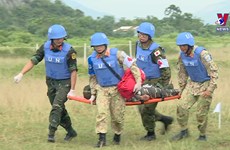International workshop discusses cleft lips and palates
Domestic and foreign health experts discussed cleft lips and palates as
well as other congenital abnormalities at an international workshop that
opened in Hanoi on November 25.
Domestic and foreign health experts discussed cleft lips and palates as
well as other congenital abnormalities at an international workshop that
opened in Hanoi on November 25.
The event, the eighth of its kind, was co-organised by the Medical University and the International Cleft Lip and Palate Foundation (ICPF).
Addressing the event, Vice President Nguyen Thi Doan blamed disadvantages suffered by children and their parents on the lack of knowledge about advanced medical technologies and outdated prejudices against the condition.
The workshop mirrors the ICPF’s special attention to Vietnam and children with deformities, she said, suggesting delegates focus their discussion on awareness-raising work and the research of new treatment methods.
The Vice President also urged measures to step up international cooperation between countries, including Vietnam, to curb cleft lips and palates, even in foetuses, bringing a better life to children and their families.
She asked domestic delegates to learn from international experience in the treatment and surgery of cleft palates to raise the quality of health services for children in Vietnam.
Statistics reveal that about 14 million people across the world suffer from cleft lip and palate, a common congenital anomaly with birth prevalence ranging from 1/500 to 1/1,000.
In Vietnam, cleft lip and palate ranks second among inborn defects with contraction rate at about 0.1 percent to 0.2 percent.
Apart from appearance, children born with cleft lip and palate may have their linguistic function affected.
According to Deputy Health Minister Nguyen Viet Tien, cleft lip and palate can be diagnosed before birth. He added that children can fully rehabilitate and reintegrate into the community after surgery.
Carrying the message of the need to stop abortion because of deformities that can be fully treated, the four-day workshop also discussed other congenital abnormalities relating to the jaw and facial bones, ear, nose and throat.-VNA
The event, the eighth of its kind, was co-organised by the Medical University and the International Cleft Lip and Palate Foundation (ICPF).
Addressing the event, Vice President Nguyen Thi Doan blamed disadvantages suffered by children and their parents on the lack of knowledge about advanced medical technologies and outdated prejudices against the condition.
The workshop mirrors the ICPF’s special attention to Vietnam and children with deformities, she said, suggesting delegates focus their discussion on awareness-raising work and the research of new treatment methods.
The Vice President also urged measures to step up international cooperation between countries, including Vietnam, to curb cleft lips and palates, even in foetuses, bringing a better life to children and their families.
She asked domestic delegates to learn from international experience in the treatment and surgery of cleft palates to raise the quality of health services for children in Vietnam.
Statistics reveal that about 14 million people across the world suffer from cleft lip and palate, a common congenital anomaly with birth prevalence ranging from 1/500 to 1/1,000.
In Vietnam, cleft lip and palate ranks second among inborn defects with contraction rate at about 0.1 percent to 0.2 percent.
Apart from appearance, children born with cleft lip and palate may have their linguistic function affected.
According to Deputy Health Minister Nguyen Viet Tien, cleft lip and palate can be diagnosed before birth. He added that children can fully rehabilitate and reintegrate into the community after surgery.
Carrying the message of the need to stop abortion because of deformities that can be fully treated, the four-day workshop also discussed other congenital abnormalities relating to the jaw and facial bones, ear, nose and throat.-VNA












